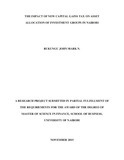| dc.description.abstract | Asset allocation decision remains the central element of portfolio construction in the investment
industry today. However, one of the key issues facing an individual is how to allocate wealth
among alternative assets mostly in the presence of capital gains tax. Many assets face both
profits from capital gains and dividends, which are taxed at different rates. Thus, this study
examined the impact of new capital gains tax on asset allocation of investment groups in Nairobi
County, Kenya. The study used a descriptive research design and a sample of 32 investment
groups in Nairobi County were selected for the study using stratified and simple random
sampling methods. Data for the study was collected using questionnaires which were
administered to the sampled group leaders from each investment group. The data collected was
analyzed using descriptive and inferential statistics with the help of the Statistical Package for
Social Studies. To test hypothesis the classical linear regression was used. The study findings
established that capital gain tax compliance costs had a positive and statistically insignificant
relationship with asset allocation decisions while capital gains tax liability had a negative and
statistically significant relationship with asset allocation decisions by investment groups in
Nairobi County. The study also established that capital gains tax knowledge had a positive and
statistically significant relationship with asset allocation decisions and by investment groups in
Nairobi County. The study concluded that there is an inverse relationship between the amount of
capital gain tax payable and asset allocation decisions by investment groups since an increase in
CGT liability would reduce the expected returns from the investments which may discourage
investors from selling their asset and instead prefer holding them. The study recommended that
the Kenya Revenue Authority and the government at large should initiate training programs on
capital gains taxation to enlighten investors on the different investment which qualify for capital
gain tax. | en_US |

